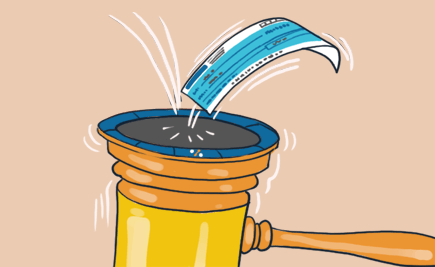Having a cheque bounce or be dishonoured due to insufficient funds is quite common in our country. But, what are the implications and legal consequences? Find out.
A cheque is a negotiable instrument in India and is normally valid for three months from its date. Bounced cheques are one of the most common offences in the country. There are over 40 lakh pending cases in the Supreme Court.
What is a bounced cheque?
A bounced cheque is a cheque which where the payment amount stated on it is not made and it is dishonoured.
A cheque can bounce for several reasons which include insufficient funds, a mismatch in the signature, stale cheques, or if there are corrections in the cheque without authentication. The bank collects a penalty from the defaulter when a cheque bounces.
The important point here is that when a cheque bounces, it is a criminal offence in India. Therefore, under the Negotiable Instruments Act, 1881, the issuer of a bounced cheque can be punished with a fine and/or a jail term.
Additional Reading: Beware Of Bounced Cheques!
What can be done in the case of a cheque bounce?
Almost every bank gives you a ‘cheque return memo’ along with the returned cheque stating the reason for the bounce. If you hold the cheque, you can inform the drawer about this and ask if it can be presented again to the bank within the 3 months period. However, this is not necessary.
If you want, you can send a legal notice to the defaulter within a period of 30 days from receiving the cheque return memo. The notice should contain all necessary facts of the matter, including the details of when the cheque was dishonoured. It is best to get this vetted by a lawyer just to ensure that all the necessary information is contained in the notice. The defaulter needs to make a fresh payment within a period of 15 days from the receipt of this notice.
However, if he/she still doesn’t make the payment within this time period, then you can file a complaint in the magistrate court. This case should be filed within a maximum period of 1 month from the date of expiry of the 15 days’ time period.
Remember, the complaint should be filed within the time frame specified. If this is not done, then the case will become time-barred and will not be entertained. When your case comes for hearing, the defaulter can be punished with a jail term of two years and/or a penalty which can be up to twice the cheque amount. The defaulter can appeal against the order within a period of 1 month of judgement.
Case 1: Bouncing of a rent cheque
In India, it is common practice for the landlord to take post-dated cheques from the tenant. In case a rent cheque bounces, the landlord can follow the above procedure to recover the dues from the tenant.
Sometimes, it may so happen that the tenant does not have the funds simply because the landlord did not drop the cheque at the expected time. Therefore, the landlord is bound to first inform the tenant and only then proceed with the legal process.
There may be another case where the tenant wishes to offset an amount from a particular month’s rent towards some expense he incurred on behalf of the landlord, which the latter refuses to pay. If there is a cheque bounce because of this, the criminal case will continue against the tenant till he is able to establish that there was a legitimate offset.
Additional Reading: Should I Buy A House Or Continue Staying On Rent?
Case 2: Check bounce for an EMI payment
When a cheque meant for an EMI payment on a loan is dishonoured, the bank can also file a case against the defaulter. However, banks do not do this as the first step.
Firstly, hefty penalties, loan default charges and cheque bounce charges are levied. These keep building up for every month of default and are added to the EMI amount. Also, the defaulter’s credit rating gets affected with every default made.
Wondering if your Credit Score has been affected by a cheque bounce made for your EMIs? You can check your Experian Credit Score for free by clicking here.
In case of secured loans like a Home Loan, banks also have the security as collateral. If the borrower does not make payments even after repeated reminders, the bank can give sufficient notice and auction the security to recover the dues.
| Want to take a loan? First, calculate your EMI. Use our EMI Calculator to break down the numbers. |
Case 3: Cheque bounce in a business transaction
If you receive a cheque from a business debtor and it bounces, then you should follow the above procedure to recover your dues. In case of bounced cheques in business transactions, the added penalty would be the loss of face in business circles, affecting your reputation and business deals.
Considering the huge number of pending bounced cheque cases in the courts, the Government is mulling to amend the Negotiable Instruments Act which will restrict the payee from taking the defaulted person to court.
According to news reports, such a person who has defaulted in making the payment will not face a jail term and the cases will be handled only through arbitration and settlement by Lok Adalats. This proposal has come under criticism from the common man, as it is believed that this will only increase cases of payment default.
Tired of making cheque payments? Try other modes of payments. A Credit Card is convenient, cashless, and easy to carry.
